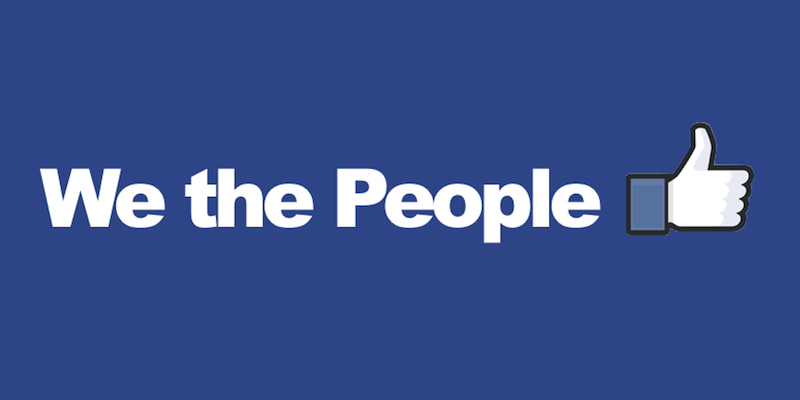Unsere vernetzte Welt verstehen

Eine Verfassung für Social Media?
Um die Vorschriften der bevorstehenden EU-Datenschutz-Grundverordnung (DSGVO) einzuhalten, werden Social-Media-NutzerInnen nun gebeten, die neuen Datenschutzerklärungen zu akzeptieren. Nach dem Datenskandal um Facebook und Cambridge Analytica stellen sich viele UserInnen jedoch die Frage, weshalb sie überhaupt noch privaten Unternehmen vertrauen und Erklärungen akzeptieren sollten, die einseitig vereinbart werden. Wäre es nicht an der Zeit, eine Verfassung für Social Media in Angriff zu nehmen? Edoardo Celeste konstatiert in seinem Artikel, der kürzlich im International Review of Law, Computers & Technology erschienen ist, dass ein ähnliches Instrument bereits existiert. In seinem Artikel analysiert Celeste vier „Bills of Rights“ der NutzerInnen Sozialer Netzwerke und vergleicht sie mit Facebook’s Nutzungsbedingungen, die einen ähnlichen verfassungsrechtlichen Ton annehmen. Celeste stellt schließlich fest, dass diese Instrumente zwar noch keine richtige verfassungsrechtliche Funktion haben, jedoch als Warnzeichen für bereits existierende verfassungsrechtliche Instrumente betrachtet werden könnten.
Dieses Thema bei Edoardo’s Lunch Talk diskutieren!
These days, even the most distracted social media user is forced to spend a couple of clicks to set the privacy settings of his beloved platform. To comply with the impending GDPR rules, social networking websites are asking users to accept their new privacy policies. Probably, many users will not completely disregard the emails and banners they receive. Maybe the most curious ones will even open the privacy policy of their platform. However, there is no doubt that even these diligent users will eventually accept the terms of service of their social networking website. Of course, they could eventually not consent to Facebook’s facial recognition, but for the rest they will not have any choice. Take it or leave it. And leaving is not an easy choice, notwithstanding the new option of data portability offered by the GDPR. Indeed, leaving would essentially mean to be excluded from a world, from a significant part of our society, in which today people interact together.
Are a couple of clicks sufficient?
What all social media users are asked to do these days stimulates a series of reflections. Firstly, are a couple of clicks sufficient to accept the rules which affect a substantial part of our life? Behind this question lies the idea that today social media represent another space, parallel to the physical one, where individuals perform a countless number of actions, from finding their job to professing their faith, which are essential in a democratic society. It is therefore apparent that the way in which social networking websites are shaped and regulated influences the exercise of our fundamental rights. By distractedly consenting to the new terms of our social media platform, we are undoubtedly underestimating the relevance of our choice. We click on ‘accept’ while we are on the bus, at work, watching the TV; there is no polling station that gives us the impression that we are making an important choice, but in reality we are casting a critical vote that will influence several aspects of our life.
Can we still trust social media companies?
A further paradox is that we are essentially forced – unless we decide not to be ‘social’ – to accept a series of rules established by social media companies, which, apparently, we do not trust any more. The recent scandal involving Facebook and Cambridge Analytica has been the tip of the iceberg. We have even seen Facebook’s CEO begging pardon before the US Congress, and recently before the European Parliament, still leaving critical questions unanswered. Moreover, beyond the question of trust, why should users simply ratify the rules undemocratically established by private companies? When users accept to use a social networking website, they also consent to respect the rules set by the owners of these virtual precincts. However, considering the impact of social media on fundamental aspects of our life, one could object that this situation is not fair and that users should have a say on these rules or, at least, establish a series of basic norms that no platform should infringe. We would need – one could say – a constitution for social media.
A constitution for social media
The lawyers will immediately reproach you when suggesting such an idea. The constitution is a concept which is firmly fastened to the nation state. The constitution is the set of rules that ensures a balance between the powers of the state and that protects citizens against those powers. Social media, instead, are mere private companies, subject to the law of the state, and, consequently, their terms of service are simply contracts between private parties. Nevertheless, at first insight, the idea that social media companies are similar to states seems to work. These websites are entities with their own territory, the platform; their own population, the users; and, of course, their own law, the terms of service. Why should they therefore not have their own constitution?
Bills of rights of social media users
This is probably the idea that inspired the authors of a series of texts which interestingly define themselves as ‘bills of rights of social media users’. As I explain in an article recently appeared in the International Review of Law, Computers & Technology, these documents do not have any binding legal value, simply being the output of single individuals or non-governmental organisations. However, their content aims to articulate a series of rights of users and obligations of platforms in a way that clearly echoes traditional constitutional texts.
Facebook’s terms of service
Interestingly, this peculiar pairing of norms regulating social media and the constitutional sphere does not seem to be an isolated occurrence. From a cursory look at the terms of service of the main social
networking websites, it is immediately possible to detect that Facebook’s show a peculiar configuration. Its terms are called ‘Statement of Rights and Responsibilities’ and refer to Facebook’s Principles, a separate decalogue of rights and freedoms broadly addressing the ‘People’ and ‘Every Person’. In this case, one could cynically consider Facebook’s adoption of this ‘constitutional tone’ as a mere way of legitimising the arbitrariness of social media’s governance or even a simple instrument of marketing, rather than thinking that it could reflect a real constitutional function.
An alert sign for national constitutional law
Admittedly, both the bills of rights of social media users and Facebook’s terms are in fact undermined by a series of significant shortcomings, if regarded as constitutional mechanisms. Essentially, the bills are not enforceable, and Facebook’s terms are intrinsically biased and undemocratic. Nevertheless, the fact that these texts are evoking the constitutional dimension is indisputable. Especially with regard to the bills of rights of social media users, pointing at a mere marketing strategy could not explain the emergence of these texts. This circumstance allows us to consider the further option that these documents are emerging to compensate a failure of the existing constitutional system. Why should one write a constitution for social media if we already have plenty of these texts at national level?
Towards a multilevel system?
Indeed, it is evident that the phenomenon of social media overtakes national boundaries, constantly evolves and creates new threats for our fundamental rights. Is the existing constitutional law able to cope with that? Do we need a specific constitution for the global environment of social media? The answer, in line with jurists’ tradition, is: it depends. In this case, it depends on the strength of existing constitutional law. If this law, which represents the pillar of our society, will be able, once again, to evolve, following the incessant development of technology, the answer is: no, we do not need a constitution for social media. However, there is no doubt that this time the route ahead for constitutional law is rising, and very fast. Therefore, in the meantime one cannot exclude an intermediary solution, a multilevel constitutional mechanism where innovative constitutional instruments flank existing constitutional law.
Dieser Beitrag spiegelt die Meinung der Autorinnen und Autoren und weder notwendigerweise noch ausschließlich die Meinung des Institutes wider. Für mehr Informationen zu den Inhalten dieser Beiträge und den assoziierten Forschungsprojekten kontaktieren Sie bitte info@hiig.de

Jetzt anmelden und die neuesten Blogartikel einmal im Monat per Newsletter erhalten.

